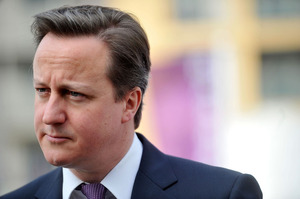 United Kingdom Prime Minister David Cameron is asking voters on May 7 to keep him at the helm for another five years because he wants to continue creating 1,000 jobs a day - a performance he claims his Conservative Party has accomplished since taking power in 2010. That's about 1.8 million new jobs.
United Kingdom Prime Minister David Cameron is asking voters on May 7 to keep him at the helm for another five years because he wants to continue creating 1,000 jobs a day - a performance he claims his Conservative Party has accomplished since taking power in 2010. That's about 1.8 million new jobs.The United Kingdom (U.K.) comprises four countries: England, Scotland, Wales and Northern Ireland. The estimated total population is 64 million.
There are about 46 million registered voters in the U.K. Registration is voluntary. An estimated 66% of the registered voters went to the polls in the last general election in 2010.
So far, no one has conclusively disputed Cameron's job-creation figure but at the same time, the Prime Minister and his brothers neglect to mention that workers' pay in the United Kingdom has not kept pace with inflation since 2010 and pay raises are few and far between.
That is a situation not unlike the labor market in the United States and most of Europe at the moment.
The unemployment rate in the U.K. stands at 5.7%, the lowest since the summer of 2008 before the full force of the financial crisis reached the global economy.
By comparison, the U.K. unemployment rate is lower than the Eurozone's 11.3%, higher than Germany's 4.8% and about the same as the jobless number in the U.S.
But those numbers may not tell the whole story. According to the Trussel Trust, the number of people using food banks in the United Kingdom almost tripled from 2013 to 2014 to about one million. So who is filling those 1,000 jobs per day, ask the jobless corps.
At 48, the six-foot-one-inch graduate of Eton College and the University of Oxford, has become a national name on the world's political stage over the past five years. Cameron has been a Member of Parliament since 2001.
He is expected to stay in power for another five years. None of his opponents to date has the name recognition Cameron brings to the polls.
The Labor Party is telling voters it has a better economic plan for the country than the one being espoused by Cameron's Conservative Party, also known as the Tories.
Labor leader Ed Miliband argues the Conservative Party's lukewarm attention to European Union issues threatens the creation of new business in the United Kingdom. Miliband says his party would work more closely with European Union's 28 country members to foster better mutual business relations.
Deputy Prime Minister and Liberal Democrat Party leader Nick Clegg says his party will take the "reasoned centre ground" during the campaign, a platform many voters are still trying to unravel.
UKIP Party leader Nigel Farage claims his party has five main election pledges, all considered old hat by his opponents.
Both Welsh Labor and Welsh Conservatives have also launched campaigns.
The Green Party of England and Wales says it could be in a king-maker position if there's a hung parliament. At the same time, The Green Party of Scotland is pushing hard for a minimum worker's wage of $14.83 per hour (10 British pounds).
Who will sit at 10 Downing Street when all the shouting and counting is done? Why David Cameron, of course. Hands down.
And that's the way it is, at this moment.

 By
By 